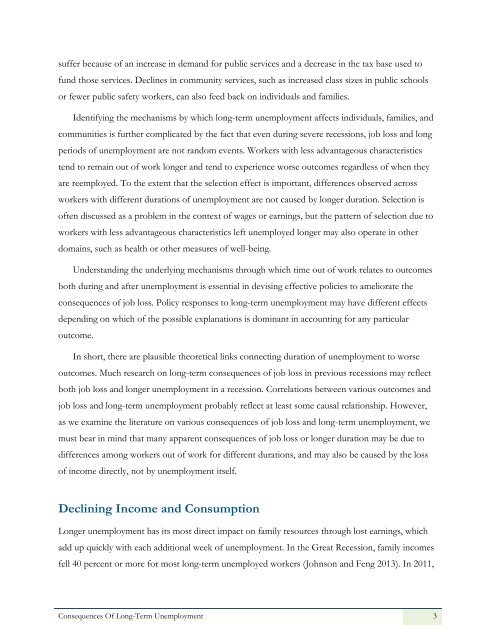Hidden Unemployment
Hidden Unemployment
Hidden Unemployment
You also want an ePaper? Increase the reach of your titles
YUMPU automatically turns print PDFs into web optimized ePapers that Google loves.
suffer because of an increase in demand for public services and a decrease in the tax base used to<br />
fund those services. Declines in community services, such as increased class sizes in public schools<br />
or fewer public safety workers, can also feed back on individuals and families.<br />
Identifying the mechanisms by which long-term unemployment affects individuals, families, and<br />
communities is further complicated by the fact that even during severe recessions, job loss and long<br />
periods of unemployment are not random events. Workers with less advantageous characteristics<br />
tend to remain out of work longer and tend to experience worse outcomes regardless of when they<br />
are reemployed. To the extent that the selection effect is important, differences observed across<br />
workers with different durations of unemployment are not caused by longer duration. Selection is<br />
often discussed as a problem in the context of wages or earnings, but the pattern of selection due to<br />
workers with less advantageous characteristics left unemployed longer may also operate in other<br />
domains, such as health or other measures of well-being.<br />
Understanding the underlying mechanisms through which time out of work relates to outcomes<br />
both during and after unemployment is essential in devising effective policies to ameliorate the<br />
consequences of job loss. Policy responses to long-term unemployment may have different effects<br />
depending on which of the possible explanations is dominant in accounting for any particular<br />
outcome.<br />
In short, there are plausible theoretical links connecting duration of unemployment to worse<br />
outcomes. Much research on long-term consequences of job loss in previous recessions may reflect<br />
both job loss and longer unemployment in a recession. Correlations between various outcomes and<br />
job loss and long-term unemployment probably reflect at least some causal relationship. However,<br />
as we examine the literature on various consequences of job loss and long-term unemployment, we<br />
must bear in mind that many apparent consequences of job loss or longer duration may be due to<br />
differences among workers out of work for different durations, and may also be caused by the loss<br />
of income directly, not by unemployment itself.<br />
Declining Income and Consumption<br />
Longer unemployment has its most direct impact on family resources through lost earnings, which<br />
add up quickly with each additional week of unemployment. In the Great Recession, family incomes<br />
fell 40 percent or more for most long-term unemployed workers (Johnson and Feng 2013). In 2011,<br />
Consequences Of Long-Term <strong>Unemployment</strong> 3

















